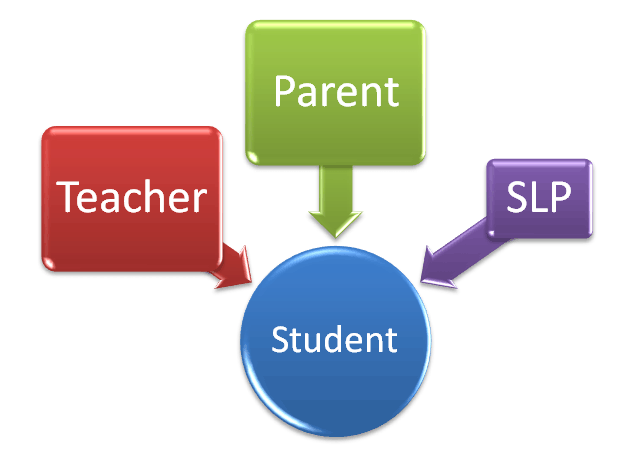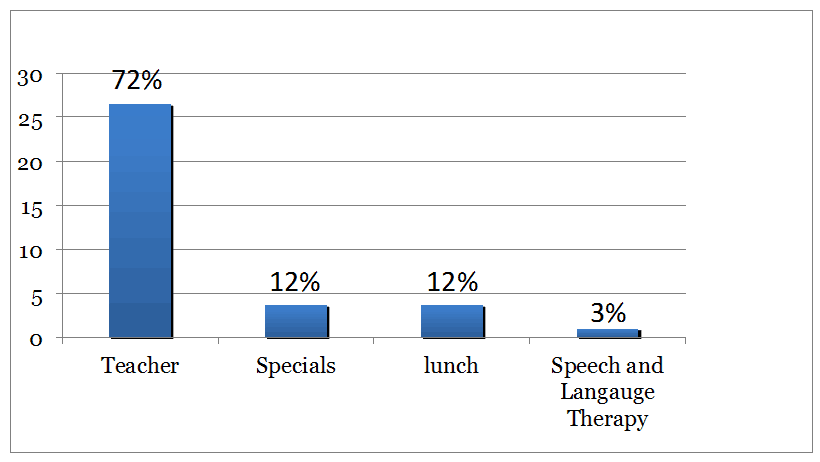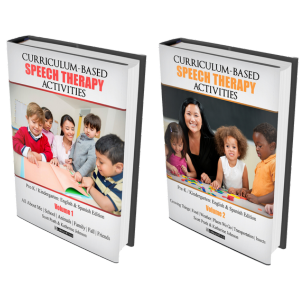 When therapeutic goals are addressed in the home and classroom, the need for services can be reduce and academic outcomes can be improved. It is not uncommon for a speech-language pathologist to see a student in individual or group settings using therapy materials chosen solely with the child’s goals in mind. While this paradigm works well for a handful of students, greater gains can be made when therapy aligns to the classroom goals and when parents can interact with their child based on what they bring home from school.
When therapeutic goals are addressed in the home and classroom, the need for services can be reduce and academic outcomes can be improved. It is not uncommon for a speech-language pathologist to see a student in individual or group settings using therapy materials chosen solely with the child’s goals in mind. While this paradigm works well for a handful of students, greater gains can be made when therapy aligns to the classroom goals and when parents can interact with their child based on what they bring home from school.
Why is using curriculum-based themes important to speech pathologists?
Research indicates that most children receiving speech-languages in school spend just 3% of an academic day with that support. That means that the majority of her time is spent with her parents and her teacher. Conversely, we know that the more ways (multi-modal) and times (opportunities) a child has to practice a skill that she is learning, the more successful she will be.
By using the classroom themes we not only access the vocabulary rich of the classroom, we provide a way for the child to practice her newly acquired communication skills on a topic she is familiar with and provide more opportunities for successful contributions in the classroom. Plus, the homework that goes home provides greater communication opportunities on each theme through interactions with parents.
Distribution of time over a student’s week
And to bring the point home further, here is collective research and information on why parent and teacher involvement is critical.
Why Teacher Involvement is Critical
- Children spend the majority of their time with teachers and parents and only a small fraction of their time with speech pathologists.
- The value that your student places on what you are teaching dramatically increases when the same words are used by their primary communicative partners.
- Frequency and consistency are two important principles that are achieved when parents, teachers, and SLPs focus on the same topic.
- Teacher buy-in and opportunities for them to work on your student’s goals are greatly enhanced when you align therapy to curriculum.
Why Parent Involvement is Critical
- Parents are the most consistent language models in their children’s lives and are their first teachers.
- Parents use of language-based strategies leads to greater receptive vocabulary at 12 years of age (Beckwith & Cohen, 1989).
- Mother’s use of labeling and increased periods of interaction lead to increases in receptive vocabulary and greater expansion of expression in older children (Tomasello & Farrar, 1986).
- Participation by fathers in early childhood programs has been shown to be beneficial to the child, father and other family members (Frey, Fewell, & Vadasy, 1989; Krauss, 1993).
- Parent empowerment leads to self-efficacy or the belief that they can make a difference in their child’s development (Dempsey & Dunst, 2004).
- When families are involved in the intervention process, language enrichment is ongoing rather than during “therapy” only (Rosetti, 2006).
Choose therapy themes that match the content of the class.
Older Students
Email teachers to identify which themes or content they are working on each week. For older students, you can have them bring their backpack and agenda planner to class so that you can see which topics they will soon be covering in English, history, social studies, and science.
Younger Students
For younger students, create materials to address the main academic topics. Add to these topics year after year until you have a collection of curriculum-based materials of your own.
| Days of the Week | Growing Things | Celebration |
| Physical Me | Food and Nutrition | Spring |
| Thinking/Feeling | Nursery Rhymes | Weather |
| Family | Sound and Movement | Real and Make Believe |
| Fall | Music | Bugs |
| Friends | Winter | Animals |
| Pets | Community Workers | Zoo Animals |
| Opposites | Traditional Tales | Farm Animals |
| Color/Shape/Size | Cowgirls and Cowboys | Ocean Life |
| Things that go together | Transportation | Big Things |
| Under Construction | Travel | Summer Fun |





You may great points on an integrated approach. I would love to have teachers share their lesson themes with me, especially above third grade, but despite my continued efforts, I have just one teacher who shares new vocabulary and concepts with me….the day before a test. I’m a pretty good eavesdropper (;-) so sometimes I discern topics in the teachers’ workroom. Would that we had shareable electronic lesson plans!
Yes! Getting the lesson plans is so worth the effort because it cuts down on your therapy planning and you get greater gains. Many teachers have to submit their lesson plans to the administration. It may be electronic and might not be weekly. Instead of having them create something special for you, be added to their email or get access to the program. Alas, you will not get every lesson plan but every theme you address is worthwhile.
Start with the easiest teacher to win over and let her/him be your spokesperson to the other teachers to let them know how much you are helping thier students. Phuong Palafox does a great job describing how to win over a campus one member at a time in this online course: